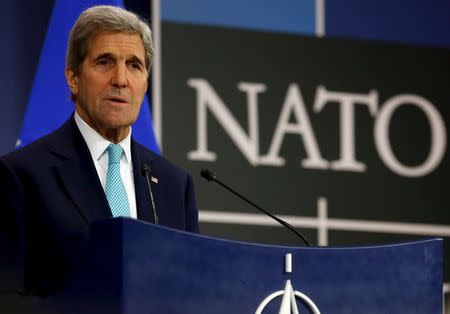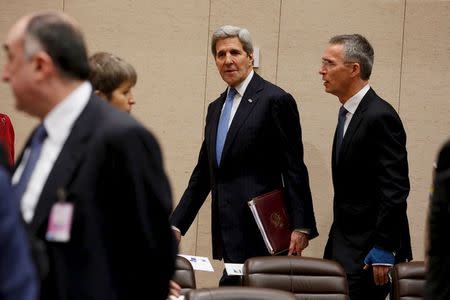Iraq briefed on U.S. special forces plan, Kerry says
By Arshad Mohammed and Sabine Siebold BRUSSELS (Reuters) - The Iraqi government is fully briefed on U.S. plans to deploy American special forces to Iraq and the two governments will consult closely on where they will go and what they will do, U.S. Secretary of State John Kerry said on Wednesday. U.S. Defense Secretary Ash Carter said on Tuesday Washington would deploy a new force of special operations troops to Iraq to combat Islamic State militants who have seized swathes of Iraq and neighboring Syria. The group is also known as ISIL and ISIS. Iraqi Prime Minister Haider al-Abadi's office said it welcomed foreign assistance but Iraq's government would need to approve any deployment of special operations forces anywhere in Iraq. He also said foreign ground combat troops were not needed in Iraq, although it was unclear whether Baghdad viewed these U.S. special operations forces in that role. "The government of Iraq was of course briefed in advance of Secretary Carter's announcement," Kerry told reporters at NATO. "We will continue to work very, very closely with our Iraqi partners on exactly who would be deployed, where they would be deployed, what kinds of missions people would undertake, how they would support Iraqi efforts to degrade and destroy ISIL." He said the United States had asked other members of the 28-nation Western security alliance to provide special operations forces to provide such things as police training, ammunition and other items to Syria's neighbors. "There are various ways in which countries can contribute. They don't necessarily have to be troops (engaged in) kinetic action," Kerry said. Nations could provide to help in Syria with medical teams, and intelligence gathering, he said. Kerry also said Turkish efforts to finish securing the northern Syrian border were discussed at a meeting in Paris this week with Turkey's President Tayyip Erdogan. "President Erdogan is completely committed and ready to proceed with Turkish forces, and in cooperation with others, to help guarantee that the remaining portion of the border is sealed," Kerry said. The United States and Turkey hope that by sweeping Islamic State from that border zone they can deprive it of a smuggling route which has seen its ranks swell with foreign fighters and its coffers boosted by illicit trade. Diplomats familiar with the plans have said cutting off one of Islamic State's lifelines could be a game-changer in that corner of Syria's complex war, although not all share Kerry's optimism on the pace of progress. Turkey is distrustful of the Syrian Kurdish YPG militia, which has proved a useful U.S. ally in fighting Islamic State. It controls adjacent territory on the eastern side of the Euphrates river, just across from Karkamis and the jihadist-held town of Jarablus. Ankara wants it to advance no further and considers the Euphrates a red line not to be crossed. (Additional reporting by Robin Emmott; editing by Ralph Boulton)



